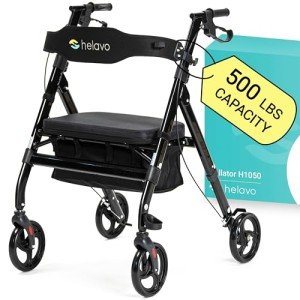Five Killer Quora Answers On Handicapped Walker
페이지 정보
작성자 Cerys 작성일 25-10-05 07:14 조회 3 댓글 0본문
The Essential Guide to Handicapped Walkers: Enhancing Mobility for Individuals with Disabilities
Walking help play an important function in enhancing the quality of life for people with handicaps. Among these, handicapped walkers, likewise referred to as walkers or rollators, are important tools that help users in preserving mobility, self-reliance, and safety. This post intends to offer an in-depth overview of handicapped walkers, discussing their types, advantages, and essential considerations for users when selecting a walker that best matches their needs.

Table of Contents
- What Is a Handicapped Walker?
- Types of Handicapped Walkers
- Requirement Walkers
- Two-Wheeled Walkers
- Four-Wheeled Walkers
- Features to Consider When Selecting a Walker
- Benefits of Using Handicapped Walkers
- Frequently asked questions
- Conclusion
What Is a Handicapped Walker?
A handicapped walker is a mobility aid created to help individuals who have problem walking or maintaining balance due to specials needs, injuries, or aging. It provides support, stability, and security, assisting users navigate their environment with greater confidence and self-reliance. Handicapped walkers come in numerous designs to match different mobility challenges, making them versatile tools for lots of people.
Kinds Of Handicapped Walkers
Understanding the various kinds of walkers is important for picking the ideal one. Below is a summary of the main kinds of handicapped walkers:
| Type | Description | Ideal For |
|---|---|---|
| Standard Walkers | Standard frame with no wheels, requiring the user to lift it to move. | Individuals with Stable Walker balance. |
| Two-Wheeled Walkers | A lightweight walker equipped with 2 front wheels for easier motion. | Users requiring more mobility support. |
| Four-Wheeled Walkers | A more advanced design with four wheels, handlebars, and frequently a seat. | Those requiring maximum support and rest options. |
1. Standard Walkers
Requirement walkers, the a lot of standard version, are constructed as a tough frame. Users lift the walker and place it forward, permitting consistent motion. This kind of Ergonomic Rollator Walker is ideal for individuals with limited mobility however who maintain excellent balance.
2. Two-Wheeled Walkers
These walkers integrate 2 front wheels, significantly boosting maneuverability compared to basic walkers. Users can push the walker instead of lifting it, making it simpler to navigate.
3. Four-Wheeled Walkers
Likewise called rollators, four-wheeled walkers featured wheels on all four legs, making them easy to press. Many designs also include a comfortable Padded Seat Walker and back-rest, allowing users to take breaks throughout longer strolls or outings.
Features to Consider When Selecting a Walker
Before purchasing a handicapped walker, it's vital to examine certain features that might enhance the user experience and security. Here are some essential considerations:
| Feature | Description |
|---|---|
| Weight Capacity | Make sure the walker supports the user's weight. |
| Height Adjustability | Try to find adjustable handlebars for a correct fit. |
| Wheels Quality | Take a look at if the wheels are robust for various surfaces. |
| Brake System | Determine if it has a reliable braking system for security. |
| Storage Options | Think about if it has a basket or bag for personal products. |
Advantages of Using Handicapped Walkers
The benefits of using handicapped walkers extend beyond mobility, providing psychological and physical advantages:
- Increased Independence: Walkers allow users to walk around without relying excessively on caretakers or relative.
- Improved Safety: With boosted stability, walkers substantially minimize the risk of falls, adding to a safer living environment.
- Improved Confidence: Users typically report feeling more secure and positive when using a walker, encouraging them to engage more in social activities.
- Health Benefits: Regular usage of a walker can promote exercise, resulting in much better cardiovascular health, enhanced muscle tone, and overall wellness.
FAQs
1. How do I know which type of walker is best for me?
Choosing the best walker depends upon your physical capabilities and mobility needs. Consulting with a health care expert or physical therapist can provide tailored recommendations based upon your specific health scenario.
2. How should I keep my walker?
Routinely inspect your walker for wear and tear, mostly focusing on the wheels and brakes. Wipe down surfaces with a damp fabric to keep it clean and shop it in a dry place when not in usage.
3. Can I use a walker on unequal surface areas?
While some walkers are much better suited for irregular surfaces than others, care is encouraged. It may be useful to choose a walker with larger wheels for much better stability on such terrains.
4. Are there walkers created particularly for outdoor use?
Yes, many four-wheeled walkers are particularly created for outdoor usage, featuring bigger wheels and more robust construction to deal with various surfaces.
5. Do walkers been available in different colors or styles?
Yes, various styles, colors, and styles are offered to deal with individual choices while still meeting practical requirements.
Handicapped walkers are transformative help that can significantly enhance the lifestyle for people dealing with mobility obstacles. By comprehending the kinds of walkers, their features, and the benefits they use, users can make educated options that line up with their individual mobility needs. As technology and design evolve, the future of handicapped walkers guarantees even higher assistance and comfort, motivating independence and an active way of life for all.
- 이전글 Quick Window Repair Tools To Help You Manage Your Everyday Lifethe Only Quick Window Repair Trick That Every Person Should Learn
- 다음글 부달온천장룸싸롱부산달리기【budal14.com】서면유흥
댓글목록 0
등록된 댓글이 없습니다.



